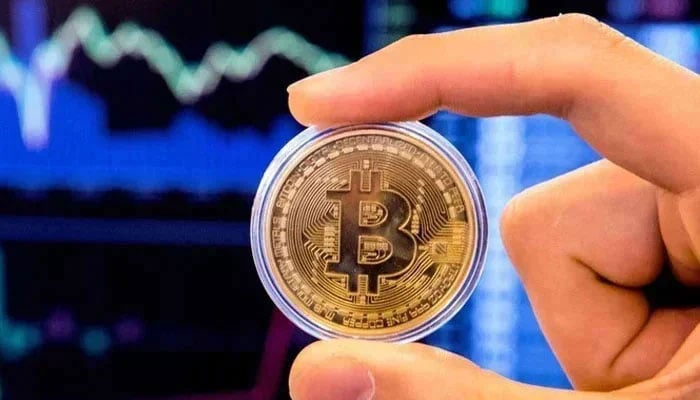New cold war
SBP and SECP must urgently issue clear and concise regulations defining legal status of cryptocurrencies in Pakistan
The cold war (1947-1991), a chilling 44-year standoff, witnessed a terrifying triumvirate of lethal weapons: ICBMs (Soviet R-7 Semyorka and American Minuteman missiles), nuclear submarines (USS George Washington, SSBN-598, and Soviet Typhoon-class submarines), and strategic bombers (Boeing B-52 Stratofortress and Tupolev Tu-95 'Bear').
Fast forward to 2025. Bitcoin, the decentralised cryptocurrency, has ignited a new cold war – silent, non-lethal yet potentially seismic, a struggle for dominance in the emerging digital finance landscape. In the new cold war, the battleground extends beyond traditional kinetic might. In the new cold war, ‘mass and manoeuvre’ are irrelevant. In the new cold war, ‘logistics and lines of communication’ hold little meaning. In the new cold war, the ability to deliver concentrated and accurate firepower is inconsequential. In the new cold war, the ability to move troops and equipment quickly and efficiently across the battlefield is of little importance.
In the new cold war, nations will fiercely compete to dominate the Bitcoin blockchain. In the new cold war, nations will strive to control Bitcoin’s mining power (Bitcoin’s block time is approximately 10 minutes). In the new cold war, a nation’s fortunes will rise or fall with the click of a mouse, as global power structures teeter on the brink of a digital precipice. In the new cold war, centralised authority is of little worth.
Bitcoin operates like a guerrilla force in the financial battleground, a defiant insurgency against centralised control. Governments, like entrenched commanders wary of losing their strategic hold on monetary policy, view Bitcoin as both an asset and a threat – equal parts fascination and fear. Donald Trump is mobilising to make the US the ‘crypto capital of the planet', aiming for financial dominance akin to securing air superiority. Vladimir Putin has declared that Bitcoin and digital currencies are unstoppable, akin to a cyber-nuclear arms race in monetary systems. Meanwhile, Xi Jinping has already deployed his digital weapon, the e-CNY or digital renminbi, signalling a preemptive strike in the new cold war.
Imagine: the State Bank of Pakistan (SBP) and the Securities and Exchange Commission of Pakistan (SECP) are akin to unarmed outposts in the face of the new cold war. Yes, the SBP and the SECP are woefully unprepared to confront the economic battles and financial skirmishes ahead. Yes, their inaction leaves Pakistan exposed, like an undefended flank on a battlefield, to significant economic and security threats. Red alert: This lack of strategic foresight is a critical vulnerability in Pakistan’s financial defence strategy, risking financial instability, economic disruption, and a diminished role in the new global theatre of operations. Yes, the SBP and the SECP have left Pakistan exposed as a defenceless position in the new cold war, turning Pakistan into an economic soft target on this intensifying global battlefield.
The SBP and the SECP must urgently develop a comprehensive regulatory framework for cryptocurrencies and blockchain technology. The SBP and the SECP must urgently address issues such as licensing, taxation, consumer protection, and anti-money laundering. The SBP and the SECP must urgently issue clear and concise regulations defining the legal status of cryptocurrencies in Pakistan. Are they considered securities, commodities, or something else entirely?
Pakistan is missing out on the transformative economic benefits of blockchain technology, such as improved financial inclusion, enhanced transparency, and more efficient supply chain management. Who is accountable for this missed opportunity? To be certain, Pakistan faces growing risks of financial instability and economic marginalisation in the new cold war.
The writer is a columnist based in Islamabad. He tweets/posts @saleemfarrukh and can be reached at: farrukh15@hotmail.com
-
 Savannah Guthrie Mom Update: Unexpected Visitors Spark Mystery Outside Nancy's Home
Savannah Guthrie Mom Update: Unexpected Visitors Spark Mystery Outside Nancy's Home -
 Elle Fanning Shares Detail About Upcoming Oscars Night Plan With Surprise Date
Elle Fanning Shares Detail About Upcoming Oscars Night Plan With Surprise Date -
 Demi Lovato Spills Go-to Trick To Beat Social Anxiety At Parties
Demi Lovato Spills Go-to Trick To Beat Social Anxiety At Parties -
 Benny Blanco Looks Back At The Time Selena Gomez Lost Her Handrwritten Vows Days Before Wedding
Benny Blanco Looks Back At The Time Selena Gomez Lost Her Handrwritten Vows Days Before Wedding -
 Naomi Watts Reveals Why She Won't Get A Facelift In Her 50s
Naomi Watts Reveals Why She Won't Get A Facelift In Her 50s -
 Travis Kelce's Mom Donna Fires Back At Critic With Sarcastic Reply After Body Jab
Travis Kelce's Mom Donna Fires Back At Critic With Sarcastic Reply After Body Jab -
 Kendall Jenner Gets Candid About Her Differences With The Kardashian Clan Over Style Choices
Kendall Jenner Gets Candid About Her Differences With The Kardashian Clan Over Style Choices -
 Sam Altman Opens Up About OpenAI, Anthropic, Pentagon Conflict
Sam Altman Opens Up About OpenAI, Anthropic, Pentagon Conflict -
 Brenda Song Confesses Fascination With Conspiracy Theories
Brenda Song Confesses Fascination With Conspiracy Theories -
 Lunar Eclipse 2026: Time, Date, Sighting Locations, Know Every Detail
Lunar Eclipse 2026: Time, Date, Sighting Locations, Know Every Detail -
 Death Toll Climbs To 54 As Floods Wreck South-eastern Brazil
Death Toll Climbs To 54 As Floods Wreck South-eastern Brazil -
 Katie Price Drops Bombshell Plan To Cash In On Marriage
Katie Price Drops Bombshell Plan To Cash In On Marriage -
 Ryan Gosling Shares How Daughters' 'honest' Feedback Keeps Him Grounded
Ryan Gosling Shares How Daughters' 'honest' Feedback Keeps Him Grounded -
 Neve Campbell Explains Why She Avoids Watching Scary Movies As She Returns To 'Scream 7'
Neve Campbell Explains Why She Avoids Watching Scary Movies As She Returns To 'Scream 7' -
 Milan Tram Crash Leaves Two Dead, 39 Injured
Milan Tram Crash Leaves Two Dead, 39 Injured -
 Timothee Chalamet Touches On His Personality's Relatability With 'Marty Supreme' Role
Timothee Chalamet Touches On His Personality's Relatability With 'Marty Supreme' Role




